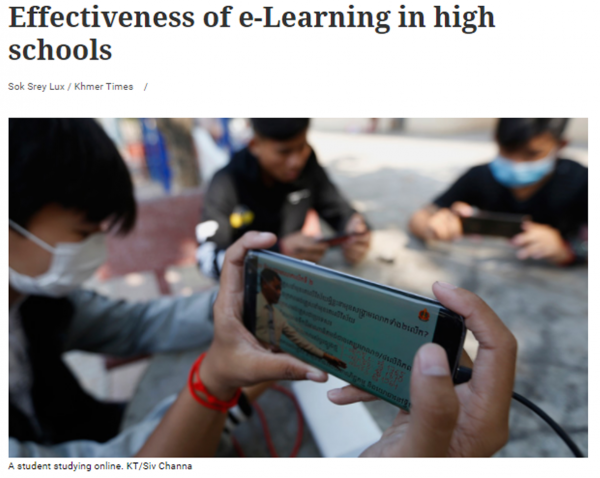Effectiveness of e-Learning in high schools
Online education which has been implemented in all levels is fairly new for the people of the Kingdom.
Students this year were left with no option but to conduct their studies via e-Learning as the government closed down all learning institutions to prevent the spread of COVID-19 in the country.
While the date for the high school national exams has not been set as yet, the exams are known to be usually held in the third week of August. However, some students remain unprepared due to doubts over their capacity to retain lessons learned online.
Houn Kanha, a senior student from Chumpuvoan High School, shared her experience on online learning.
“I study hard and do the exercises assigned by teachers. With the hard work that I have been putting in, I think I’m ready for the upcoming Baccalaureate exam”, she said.
She added: “I have been studying from various online tools and platforms, including videos the ministry has posted, private online courses and also through the assigned work from my teachers.”
A senior student from Kampong Speu province, on the other hand, has an opposite reaction over the e-Learning process.
Phally Kanha from Veal Pong High School said: “I only have a 50 percent chance of passing the exams through e-Learning. I am having a hard time interacting with teachers and also here in the province, the internet service is very unstable”.
Kanha said several factors contribute to her lowered chances of passing, including the lack of interaction with classmates and teachers and the inability to ask questions which can be readily answered by teachers, unlike when she studied in a classroom setting.
She said she only studies from her books and relies on the work assigned by her homeroom teacher. She added she doesn’t have any private online classes as her family cannot afford them.
Dy Khamboly, Education Ministry spokesman, said yesterday there is no sufficient research to determine whether e-Learning is effective or not but within this short period of time, he said the ministry has come up with various strategies to continue education in Cambodia.
He said: “With the closing of schools, our educational process has been affected and the best alternative is e-Learning. The Cambodian government has already set out a number of measures to promote online teaching and learning, as a part to ensure educational sustainability in the Kingdom.”
“Some of the platforms created with e-Learning include radio and TV stations broadcasting teachers conducting lessons.”
He added the high school exit exams, also known as BacII, will retain the standards as in previous years.
Chea Sophea, biology teacher at Preah Sisowath High School told Khmer Times that she has tried to teach through the various platforms, even using the school’s app for students to access online classes.
Sophea said keeping control of the environment during monthly tests has been especially challenging as some students take advantage of the online connectivity to look up the answers while taking the exam.
Chap Pisit, a math teacher at Preah Sisowath High School, also shared his point of view towards the quality of online studying. He pointed out how his students’ focus on their studies has dropped after the schools closed down.
“For my students, I would say the possibility of passing the Baccalaureate exam is about 45 to 60 percent. It depends on whether they put in the effort to study during this time,” he said.
He said: “Since we have never experienced this kind of learning, I would say the quality of the education received by students might drop if online classes continue.”
Social Action for Community and Development’s (SACD) survey done from May 4 to May 23 found that students and parents are having a hard time adapting to e-Learning.
“These challenges include additional expenses for internet services and purchases of devices [such as computers, smartphones, iPads or tablets] as well as loss of time caused by slow internet services or disruptions,” SACD said in its report.
Chrek Sophea, SACD coordinator, said the results of the survey show a substantial inequality among students in Cambodia when it comes to e-Learning.
“Children who are sent to expensive, private schools are more familiar with and better equipped for distance learning, while children from underprivileged families are having a hard time attending online lessons,” she said in May.
“Low-to middle-income families who have been affected financially amid the pandemic are likely to focus more on their livelihood and wellbeing rather than their children’s education.”
With school closures, UNDP estimates the “effective out-of-school rate” – the percentage of primary school-age children, adjusted to reflect those without Internet access – indicates that 60 percent of the children are not receiving education, leading to global levels not seen since the 1980s.
On April 8, the government decided to delay the Baccalaureate and Diploma exam to curb the spread of the virus.
This came after the government shut down all the schools in the country on March 16.
A statement from the Education Ministry yesterday said the BacII for private schools will be held on August 17 and 18.
https://www.khmertimeskh.com/744799/effectiveness-of-e-learning-in-high-schools/
